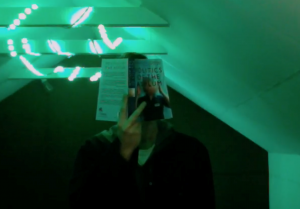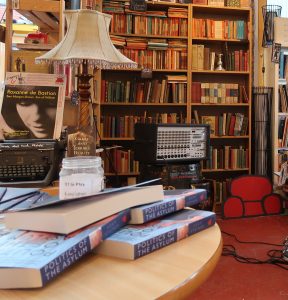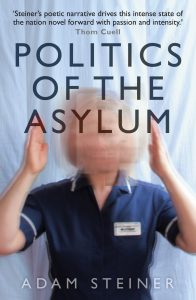FIRE & DUST MEETS ADAM STEINER
POLITICS OF THE ASYLUM BY ADAM STEINER
Urbane Publications
ISBN 978-1-911331-86-5
£7.49/312 pages
Adam Steiner is a writer of fiction, poetry and journalism (primarily articles/essays/book reviews) whose work has appeared in numerous publications. He is former Editor of HCE magazine, founder of Coventry’s Fire & Dust poetry events, and Director of Silhouette Press, a not-for-profit publisher which encourages creative writing and skills education, with a focus upon supporting people under-represented in the industry.
Adam was also selected for the 2014 Ó Bhéal Coventry-Cork Twin Cities Poetry Exchange and was part of the Coventry SHOOT Festival, 2014. Further to this, he produced the Disappear Here project (a series of 27 x poetry films about Coventry ring-road – see our article in The Brutal Issue). He is currently engaged as a mentor with youth charity Arts Emergency.
On 2nd August 2018, Adam returned to Coventry to give a reading at Fire & Dust of his new novel Politics of the Asylum (Urbane Publications). We caught up with him after the gig, to ask a few questions…
We don’t want to pigeonhole you, so – in your own words, can you tell our readers what you do and what you’re about?
I’ve been writing on-and-off for many years following graduation from university. I sometimes write articles, reviews, poetry and some fiction, but most of my time to date was spent on the novel, which took me many years to complete.
Now, I do lots of different things: some teaching, more poetry film work, but gradually edging towards becoming a more stable writer – if there is such a thing.
This description is very typical of most writers, I imagine, where we all differ is the work produced – that’s what makes us exciting and individual.

Similarly, we don’t want to mislabel your novel… How would you summarise Politics of the Asylum, and is there a name for the genre or form in which it’s written?
I had a few ideas of how the novel could be pitched when I was in the middle of writing it – I see it chiefly as a Modernist take on NHS decline; a dystopia-to-be. But in terms of style, I thought stream-of-consciousness clashed with a pop-art sheen – pushing for deeper themes and ideas, behind an aesthetic of lyric-rich prose that is full of references and continually distracted with itself – which I think makes it a product of the age we live in now.
What were your main aims when creating this story? Is your message one of futility, or a call-to-arms?
Hopefully a bit of both; as discussed with the author Marc Nash, I’m not sure I believe in political novels bringing about concrete charge – 1984 is largely descriptive of a situation, but it didn’t stop the world going into an age of mass surveillance – but they can certainly be the spark of awareness.
At best, I think PotA is my way of saying that people who are sick at heart will always exist (perhaps this is a quantifier of “evil”), and they will always subvert and destroy good things in the world. But equally, sickness and illness are part of our existential lot, and so much of what happens to the body and the mind is out of our control – so there is a resistance of negative forces while fighting to maintain our health, which gives us the opportunity to do good things – maybe to protest?
Protagonist Nathan is a hospital cleaner, and the novel is influenced by your real-life experiences of working as domestic staff in a hospital. What was the best thing and worst thing about that job for you?
I genuinely felt I made a difference; especially having a chat with patients who were bored and lonely as I was. I wasn’t entirely selfish, selling ad-space in a vacuous London office block to plug shit that people don’t want or need – easy dreams for idiots, by idiots. Daft as it was, I knew my life was lowly but it was never a joke. This in turn taught me the value, or not, of money [everyone dies].
The worst thing was the number of older patients dying off and seeing them suffer with their old age. Other people also died in and around the hospital at that time – which is alluded to in the book – so I was in my early twenties and surrounded by a lot of death and decline. I took a lot of that too much to heart, so that whole experience was generally depressing and, ultimately, I felt like I was just part of a larger process.
All of the above sounds utterly like Nathan, so there you go…
If you can say without getting yourself or HCE into legal trouble…how true to life are the incidents of physical violence toward, and neglect of, patients in your story?
A mixture; like all books, especially novels, and increasingly with the popularity of creative non-fiction, people put themselves in situations and give you a very personal take on it that is also relatable. I think this is what great writers are able to do; I find myself more alienating of the reader.
The fact is, so much of creating and writing a character is a composite exercise; I wrote a fair bit about people dying, but they are not necessarily the same individual people I knew who had died. Regarding violence, it’s a subtle thing depending upon how it is performed or acted upon; power has the potential to move people in different ways, and even indirectly you can cause suffering and pain without knowing or meaning to. I’m talking philosophical acts and omissions here, the ways in which the choices we make, or not, have far-reaching impact beyond our knowing it, so the violence and neglect were manifest in many strange ways*, that I felt and noticed but others didn’t – so did they even happen?
*Especially at management levels, people who didn’t care or know what they were doing, or worse still, convinced themselves they cared and were able to go about every day like all was well with the world.

What type of reception has Politics of the Asylum had from from readers who work for the NHS? Are they pretty angry about how you’ve represented the NHS, or do they appreciate the book’s message and recognise aspects of their roles that ring true?
Up and down, people can get as angry as they like, it seems to be the common mode these days. I certainly didn’t set out to upset anyone – some people have agreed with my highlighting of the wider NHS problem, but so few of us can say how to solve it. I think lots of people recognised the mundanity, process and repetition that seems to work against caring and giving a fuck [slight distinction].
How important is experimental writing to help keep the literary world fresh and lively?
Ask the best-selling authors! For me – it’s important to push on the wheel of literature, do your part to try something different and to challenge yourself and readers. So many people think being a writer only needs to be producing a serviceable example of the product – a novel – as it was intended, an entertainment for the leisured classes, I find that frustrating, because I get very little emotion or peronsal input from people doing genre work for its own sake, but equally it’s not for me to tell anyone what or how to write, I do think we could all learn from each other, but let me put it this way, I don;t think I could push out a designated page-turner – but then, why can’t books be both things?!
Did you have concerns about the novel not being accessible enough (for instance, to readers who are turned off by literary fiction), or did you deliberately make it a challenging experience?
A bit of both. There was certainly an element of fuck you. I was a cleaner, there were no expectations on either side of me writing anything; it was the freest I ever felt writing the book, because nothing mattered; I did it because I felt it, very strongly. It could just have easily remained a lived but unwritten exercise, if you know what I mean. I wanted to challenge myself, and I think some of the lyricism might grind some readers down, but I also wanted it to contain forms of language that were at times poetic and blunt, to jar people’s brains out of standard cognizance, so they could blow their minds on the bus to work. I’m not sure if that’s what I wrote – but I am proud because I don’t think there is anything out there quite like it – it is a beautiful freak.

Did you enjoy the process of getting published, working with an editor etc.? I imagine a novel in this style, with its crossover between poetry and prose, is a difficult but rewarding text to edit.
I did enjoy being published – in fairness, there wasn’t much for anyone to edit, because the novel is such a fantastic mess, it’s very hard to pick apart the prose to make constructive changes.
That being said, Matthew at Urbane Publications was very helpful in making last minute changes and very supportive of all my artwork being placed in the book. And that’s a very positive relationship to have with a publisher, to support rather than to dictate or challenge upon standard marketing mores.
How long did it take to write the novel, and what is the best piece of advice you can offer to aspiring novelists?
Ages. A really long time. I spent perhaps too long working on it, especially editing it down, but I have since made up for lost living…
Don’t give up.
Are you one of those disciplined writers with a strict writing routine?
Yes and no – the key thing is to focus and think about what you want to achieve, but mainly to keep going and see it through. So easy to quit or to write with your brain/eyes/ears/heart closed – then it’s just dead lit.
Also, whisky sometimes helps…
Following on from the success of the Silhouette Press poetry collections and last year’s Disappear Here poetry films, Politics of the Asylum is an impressively original debut. What’s next on the horizon?
As above, more grown-up living and remembering to be there for others [old and new] who are really important to you, and you to them. It sounds OTT, but given the amount of time writing takes you away from other humans, it’s very important to work on your relationships and friendships – art hurts but life is real.
I’m writing a non-fiction book about Nine Inch Nail’s seminal 1994 album, The Downward Spiral – in relation to America’s culture of violence, Nietzschean philosophy and of course the music. So, plenty of laughs.
 Plug some social media/upcoming gigs:
Plug some social media/upcoming gigs:
Twitter: @BurndtOutWard
I’ll be reading in London on 6th September 2018, at an event called Verbal Discharge – not sure of the venue yet, but save the date!
Also – I’m open to readings in other towns and places if anyone is interested!
Where can people go to buy your book?
Politics of the Asylum is available from: Hive.
Try to avoid Amazon where you can, it’s only good for ratings, as is Goodreads, but it doesn’t earn the publishers much money – and they produce all the books! Although, if you’re on a budget, fair play, click away…
Editor’s note: at the time of publishing this article, the novel was priced at 97p cheaper on Hive than on Amazon.

